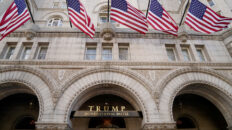In 1935, culture critic and homme de lettres Alexander Woollcott dashed off a blistering riposte to ad flack Paul Harper, account representative for the Cream of Wheat Corporation, the famed farina producer. Cream of Wheat sponsored Woollcott’s influential radio variety show. A rascally bon vivant with unswerving opinions, Woollcott ran afoul his starchy professional matutinal-meal funders for, of all things, fulminating against the likes of the Führer and Il Duce.
The timing was, to put it gently, not auspicious. The Nuremberg Laws had just been decreed. Italy was undermining the fragile League of Nations by warring with Ethiopia. The Shoah was only a half-decade away.
The stilted, PR-washed correspondence Woollcott received: “The Cream of Wheat Corporation is unwilling to continue the broadcasts after December 29th unless you will agree to refrain from including in your broadcasts material of a controversial nature which, in our opinion, would be offensive to groups or individuals in the radio audience.”
Ah—the good ol’ money-making days of pure entertainment neutrality! I’d ask Colin Kaepernick to take note if he was still interested in major-league pigskin rather than Netflix specials. Woollcott had earlier received this admonitory note from the same party, which referenced two Cream of Wheat executives: “They went on to say that they preferred that you didn’t make any more caustic references to people like Hitler and Mussolini as there are large racial groups who are apt to be antagonized by these references.”
Oh, won’t somebody please think of the Fritz!
These missives are interesting to read not just for their historical misjudgment, but because of how closely the corporate stance hews to political inoffensiveness. With the sordid exception of China (looking at you, House of Mouse), American companies, and even multinationals selling wares in our borders, no longer play Sweden in our fractious sociocultural wars.
Major brands now take a political stance, come what profit-losses may.
The first inklings of corporations dropping Michael Jordan’s business-acumen adage “Republicans buy sneakers, too” came in 2014, when then-Indiana Governor Mike Pence signed into law the Religious Freedom Restoration Act, which granted broad legal immunity for business proprietors to exercise their religious faith within commerce, the most infamous case being a Christian chef pâtissier declining to serve a gay wedding. A clan of corporate titans, including Apple, Salesforce, Google, and the NCAA, crashed upon the state, threatening boycotts, and clubbing it into submission.
The death of George Floyd tremored another wave of corporate activism, with every retailer from Payless to PetSmart hanging a “Black Lives Matter” marquis above their front doors. Click-hungry journalists and liberal activists hounded holdouts that didn’t explicitly endorse the ACAB spirit of the flaming hot summer. Woke went corporate—with little to no backlash to speak of. It was an activist triumph: Bernie bros and sisters now pulling the strings of the Fortune 500. “Eat the rich” sublimated to “corporate social responsibility.”
But just as woke capitalism was getting into full gear, the wokeshivitiz, like their 18th-century French counterparts, are now leery of their creation. Progressive activism is being subsumed by rampant commoditization, overtaken by what English novelist Paul Kingsnorth calls “the Machine.” CBS was readying the launch of a new reality TV show dubbed “The Activist” that was framed as a kind of “American Idol” competition for political movers and shakers. But the show’s original premise has been scrapped, with the leftovers reformatted into a documentary after outcry from—who else?—the same prog posters who hold activism up as a sacerdotal rite.
The near-religious significance liberals imbue political agitation with was reflected in the groveling statement put out by CBS: “However, it has become apparent the format of the show as announced distracts from the vital work these incredible activists do in their communities every day. The push for global change is not a competition and requires a global effort.”
Yes, yes, “global change,” a euphemism for one or more national powers bullying weaker countries around, requires more coordinated efforts away from the spectorial camera eye. With a few verses of “Kumbaya” sprinkled on top, of course.
It would seem the activists incensed by “The Activist” forgot about Marx’s critique of endless consumption: “The need of a constantly expanding market for its products chases the bourgeoisie over the whole surface of the globe.”
The political protest was morphing into another mass-manufactured Big Mac or Hanes white t-shirt. So, it too had to be protested, and quashed.
This should leave any true red-blooded Marxist in a brainstorm of uneasy cognitive dissonance. Speaking out against the liberal checklist of inequalities now pays. I don’t mean it pays a meagre stipend to live on Saltines and Jif. But it rings the register big. Just ask Black Lives Matter founder Patrisse Khan-Cullors if you can get her on the line when she’s wintering in her Bahaman manse.
Rather than subvert America’s capitalist structure, the opposite is happening: money-makers are exploiting leftism to keep stock prices high. Bank of America extending mortgages to married transgender couples, Amazon banning racist and reactionary literature, PayPal cutting off services to white nationalist groups, Molotov-cocktail lobbers printed on cheap ceramic mugs—brilliant marketing moves, all. Cashing in on liberal goodwill has never been so lucrative.
CBS may have misjudged how many cents it could squeeze from arrogating progressive activism. But it won’t be the last attempt to turn leftie internet outrage into revenue. “Go woke go broke” is out; “go red make bread” is in. The New Model Man takes selfies wearing Antifa shirts from Walmart.com and Gucci loafers, or, for the Marxian Misses, a tailor-made “tax the rich” wool jacket dress.














Add comment